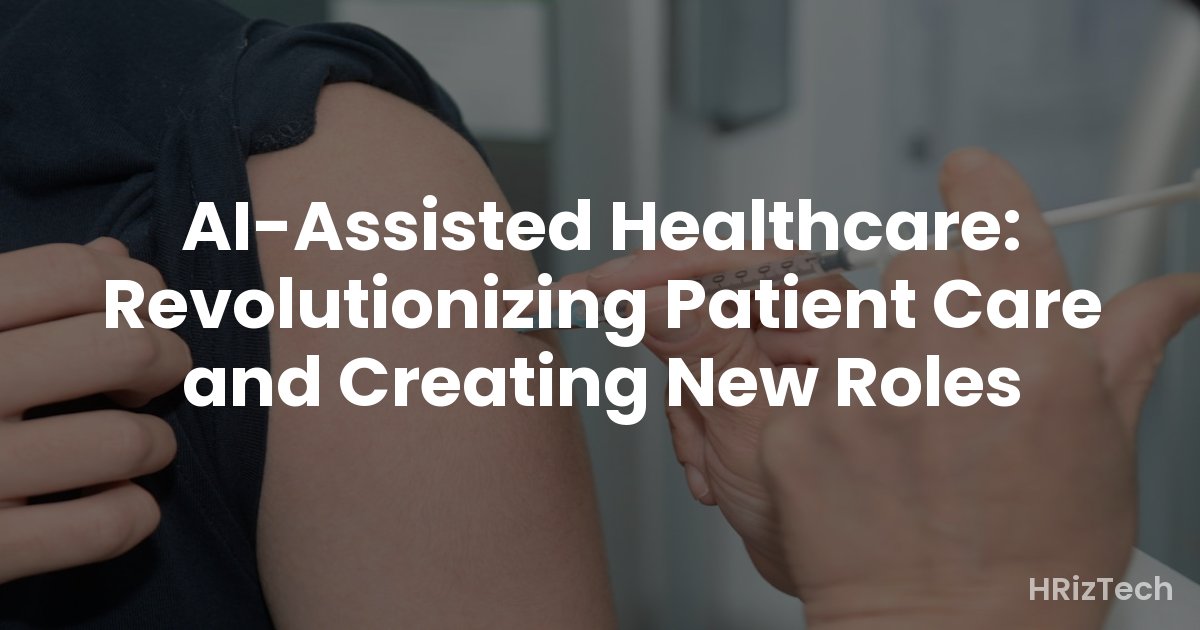AI-Assisted Healthcare: Revolutionizing Patient Care and Creating New Roles

AI-Assisted Healthcare: Revolutionizing Patient Care and Creating New Roles
- AI is rapidly transforming healthcare, improving patient care and creating exciting new job roles.
- New career paths are emerging in AI development, implementation, and ethical oversight within healthcare.
- AI tools are enhancing diagnostics, treatment planning, and personalized medicine, leading to better health outcomes.
- Understanding the ethical implications and potential biases of AI in healthcare is crucial for responsible implementation.
The AI Revolution in Healthcare: More Than Just a Buzzword
Artificial intelligence (AI) is no longer a futuristic fantasy; it's rapidly reshaping the healthcare landscape. From streamlining administrative tasks to assisting with complex diagnoses, AI is proving to be a powerful tool with the potential to revolutionize patient care and create a wave of new, high-demand jobs. But what exactly does this revolution entail, and what opportunities does it unlock for the future workforce?
Enhanced Diagnostics and Treatment Planning
One of the most significant impacts of AI in healthcare lies in its ability to enhance diagnostics. AI algorithms can analyze medical images (X-rays, CT scans, MRIs) with remarkable accuracy, often identifying subtle anomalies that might be missed by the human eye. This leads to earlier and more accurate diagnoses, allowing for timely interventions and improved patient outcomes. Furthermore, AI is assisting in treatment planning. By analyzing patient data, including medical history, genetic information, and lifestyle factors, AI can help doctors personalize treatment plans, optimizing effectiveness and minimizing side effects.
AI-Powered Drug Discovery and Development
The pharmaceutical industry is also benefiting immensely from AI. AI algorithms can analyze vast datasets to identify potential drug candidates, predict their efficacy, and optimize clinical trial designs. This accelerates the drug development process, potentially bringing life-saving medications to market faster and more efficiently. This speed and efficiency translates into improved patient access to innovative treatments.
Personalized Medicine: Tailoring Care to the Individual
The era of one-size-fits-all healthcare is fading. AI is paving the way for personalized medicine, where treatment plans are tailored to the unique characteristics of each patient. By analyzing genomic data, lifestyle factors, and medical history, AI can predict an individual's risk of developing certain diseases and recommend preventative measures. This proactive approach to healthcare can significantly improve health outcomes and reduce the burden on healthcare systems.
The Rise of New Healthcare Roles
The integration of AI into healthcare is not just about replacing human workers; it's about creating new, exciting roles that require specialized skills and expertise. The demand for professionals with expertise in AI development, implementation, and ethical oversight within the healthcare sector is skyrocketing.
AI Healthcare Specialists: The Future Workforce
We are witnessing the emergence of roles such as:
- AI Healthcare Data Scientists: These professionals specialize in collecting, cleaning, and analyzing large datasets of patient information to train and improve AI algorithms.
- AI Medical Image Analysts: They work alongside radiologists and other medical professionals, interpreting AI-generated analyses of medical images.
- AI Clinical Trial Managers: These individuals oversee the design and execution of clinical trials, utilizing AI to optimize trial design and accelerate the drug development process.
- AI Ethics and Regulatory Specialists: These professionals are crucial for ensuring the responsible and ethical development and deployment of AI in healthcare, addressing issues such as bias and data privacy.
- AI-Assisted Healthcare Providers: This broad category includes doctors, nurses, and other healthcare professionals who are trained to utilize AI tools effectively in their daily practice.
Addressing Ethical Concerns and Potential Biases
While the potential benefits of AI in healthcare are immense, it's crucial to acknowledge and address the potential ethical concerns and biases. AI algorithms are trained on data, and if that data reflects existing societal biases, the AI system may perpetuate and even amplify those biases. Ensuring fairness, transparency, and accountability in the development and deployment of AI in healthcare is paramount. Robust regulatory frameworks and ethical guidelines are essential to prevent unintended consequences and ensure that AI benefits all members of society.
The Future of AI in Healthcare: A Collaborative Approach
The future of AI in healthcare is not about humans versus machines; it's about humans and machines working together to deliver better patient care. AI tools can augment the capabilities of healthcare professionals, allowing them to focus on tasks that require human empathy, critical thinking, and complex decision-making. This collaborative approach will lead to more efficient, effective, and compassionate healthcare for all.
Key Takeaways
- AI is transforming healthcare, improving diagnostics, treatment, and patient care.
- New job roles focused on AI development, implementation, and ethics are emerging.
- Personalized medicine is becoming a reality thanks to AI-powered analysis.
- Ethical considerations and bias mitigation are crucial for responsible AI implementation.
- The future of healthcare involves a collaborative human-AI approach.
So, what are your thoughts on the ethical implications of AI in healthcare? Share your perspectives in the comments below!
}, { "@type": "Question", "name": "What new job roles are emerging in AI-assisted healthcare?", "acceptedAnswer": { "@type": "Answer", "text": "New roles include AI Healthcare Data Scientists, AI Medical Image Analysts, AI Clinical Trial Managers, AI Ethics and Regulatory Specialists, and AI-Assisted Healthcare Providers (doctors, nurses utilizing AI tools)." } }, { "@type": "Question", "name": "What are the ethical concerns surrounding AI in healthcare?", "acceptedAnswer": { "@type": "Answer", "text": "Major concerns include potential biases in AI algorithms (due to biased training data), data privacy issues, and the need for transparency and accountability in AI decision-making." } }, { "@type": "Question", "name": "How is AI enabling personalized medicine?", "acceptedAnswer": { "@type": "Answer", "text": "AI analyzes patient data (genomic information, lifestyle, medical history) to predict disease risk and tailor treatment plans to individual needs, moving away from a one-size-fits-all approach." } }] }
Comments
No comments yet. Be the first to comment!